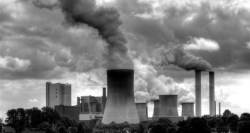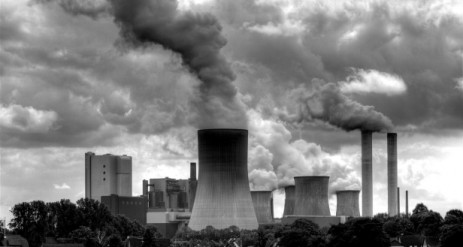 The World Bank, an international financial institution with a mission of bringing people out of poverty, took an unprecedented step last week when it released an unflinching report about the destruction soon to be wrought by climate change. The report, “Turn Down the Heat,” painted a picture of a world scalded by a 4 degrees C temperature rise. It was hailed as a crucial step in aligning climate change action with worldwide business and development interests. After all, no one would call the World Bank a bastion of treehugging hippies — if it is urging action, perhaps even the reticent rich will start to listen?
The World Bank, an international financial institution with a mission of bringing people out of poverty, took an unprecedented step last week when it released an unflinching report about the destruction soon to be wrought by climate change. The report, “Turn Down the Heat,” painted a picture of a world scalded by a 4 degrees C temperature rise. It was hailed as a crucial step in aligning climate change action with worldwide business and development interests. After all, no one would call the World Bank a bastion of treehugging hippies — if it is urging action, perhaps even the reticent rich will start to listen?
Fast-forward one measly day: The nonprofit World Resources Institute released a completely unrelated working paper [PDF] highlighting just how far the world is from abandoning our favorite fossil fuels, and avoiding the 4-degree hellscape the World Bank envisions. There are currently 1,199 coal-fired power plants under proposal around the world, according to the group. The bulk of them (76 percent, to be exact) are in China and India.
The timing of these two reports seems serendipitous at first: An esteemed and central member of the world’s financial elite shouts “fire!” from a rooftop, followed immediately by the revelation that this terrifying conflagration is almost certainly on its way if we continue to burn coal along our current trajectory. The problem, though, can be found on page 19, table IV, of the WRI report on coal plants: The second-largest public international financier of coal-fired power plants around the world is — you guessed it, the World Bank Group.
According to WRI, the World Bank is currently funding 29 coal plants, to the tune of a cool $5.3 billion. Only the Japan Bank for International Cooperation is spending more, at over $8 billion. The right hand (“Holy shit, stop emitting carbon dioxide and heating up the planet!”) apparently does not know what the left (“Here’s $5 billion, go burn some dead dinosaurs!”) is doing.
It is as infuriating as it is familiar. A growing number of staid and heady financial institutions trumpet climate change risks to the public (e.g., reinsurance giant Munich Re’s recent warning) and yet the money continues to flow to coal plants, to tar-sands projects and pipelines, to Arctic oil exploration.
The easy explanation is that it is simply a matter of short-term greed (and need, in the case of bringing electricity to those who don’t have it) winning out over long-term caution. But the World Bank’s example is hard to fathom. The institution’s president, Jim Yong Kim, began his introduction to “Turn Down the Heat” with the following: “It is my hope that this report shocks us into action.”
Is that meant for all of us, or is it more of a royal “us”? Did he really mean, you know, his own bank? Because it appears to be in need of a good shocking itself.
In recent years, the World Bank has come under fire for some of its coal plant backing, most notably the immense, 4,800-megawatt Medupi power station in South Africa. That loan alone was for $3.75 billion, approved in April 2010. The project lasts until 2015, according to the World Bank’s website. Eighteen months after approval, an internal review found that the bank failed to follow some of its own environmentally related policies in green-lighting the loan.
In early 2011, the World Bank began considering changing its rules regarding coal plant lending. The changes would have basically restricted funding only to the poorest countries, leaving places like Vietnam, India, and South Africa off the list. “It was quite forward-leaning,” says Justin Guay, a Washington representative in the Sierra Club’s international program. “It was a strong referendum on the fact that coal is not a fuel source that belongs in the 21st century.”
Unfortunately, the plan fizzled in the face of opposition from China and India (countries, which, oddly enough, don’t really need World Bank funding to build coal plants). The bank is now stuck with an energy policy written more than a decade ago.
Why does this matter, given that the Bank’s dollars don’t measure up to other sources of fossil fuel funding (like, say, the U.S. Export-Import Bank, which sends billions to fossil fuel projects every year)? “What the World Bank says about coal is hugely influential at national levels as well as at other financial institutions,” Guay says. World Bank leaders tend to cycle in and out of governments and other high-level financial institutions, and the Bank carries influence that outweighs its cash. “If the World Bank says we will no longer fund coal, it is not something that should be funded by development institutions, it would have a huge impact in the international financial world.”
With climate talks in Doha now underway, the fundamental issue of climate action will again be back on the table: How do we help the poorest people improve their lives while keeping our emissions from spiraling out of control? (Well, more out of control.) The World Bank president writes in the new report that his institution is “a leading advocate for ambitious action on climate change, not only because it is a moral imperative, but because it makes good economic sense.”
Then how to justify the continued support of coal? The only comment forthcoming (in spite of repeated requests) from the World Bank was from a press call when the climate change report was released. Kim said that the Bank does “everything we can not to invest in coal — everything we possibly can,” but added that sometimes it can still be the only option. Rachel Kyte, the vice president of sustainable development at the Bank, did write last week that the “Turn Down the Heat” report will force a “hard look at our work,” but it is unclear exactly what that means. No major policy shift has been proposed, and with the world glumly staring down a “baby steps” approach in Doha it seems unlikely that a World Bank delegation will shock COP18 into action.
As many others have said, this shouldn’t be an either-or: Action on climate change is a money maker over the long run, without question. And even within the World Bank’s specific purview — poverty reduction — the math seems clear. The Bank’s report lays bare some of the worst results of 4 degrees of warming, and points out that many of them disproportionately target the world’s poorest people. Yes, more than a billion people still lack electricity, but building 1,200 coal plants is not going to help those people in the long run, or even the relatively short run.
If they want to shock us into action, a good start might be to cut out coal plant funding entirely; we appreciate the reports, but cash is a much better motivator. When the biggest financial institutions in the world start putting their money where their heated, impassioned rhetoric is, then we’ll be getting somewhere.



